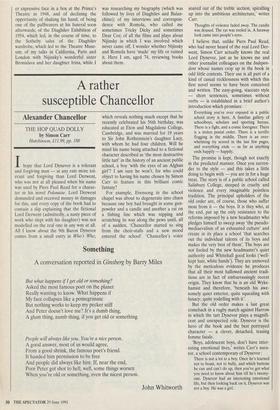A rather susceptible Chancellor
Alexander Chancellor
THE HOP QUAD DOLLY by Simon Carr Hutchinson, f11.99, pp. 188 Ihope that Lord Dynevor is a tolerant and forgiving man — at any rate more tol- erant and forgiving than Lord Derwent, who was not at all pleased when his name was used by Piers Paul Read for a charac- ter in his novel Polonaise. Lord Derwent demanded and received money in damages for this, and every copy of the book had to contain a slip explaining that the fictional Lord Derwent (admittedly, a nasty piece of work who slept with his daughter) was not modelled on the real one in any way at all. All I know about the 9th Baron Dynevor comes from a small entry in Who's Who,
which reveals nothing much except that he recently celebrated his 56th birthday, was educated at Eton and Magdalene College, Cambridge, and was married for 19 years to Sir John Rothenstein's daughter Lucy, with whom he had four children. Will he mind his name being attached to a fictional character described as 'the most destructive little tart' in the history of an ancient public school, a boy 'with the eyes of an Afghan girl'? I am sure he won't, for who could object to having his name chosen by Simon Carr to feature in this brilliant comic fantasy?
For example, Evensong in the school chapel was about to degenerate into chaos because one boy had brought in some gun- powder and a candle and another a rat on a fishing line which was nipping and scratching its way along the pews until, all of a sudden, 'Chancellor started to sing from the choir-stalls and a new mood entered the school'. 'Chancellor's voice soared out of the treble section, spiralling up into the ambitious architecture,' writes Carr.
Thoughts of violence faded away. The candle was doused. The rat was reeled in. A faraway look came into people's eyes.
I believe that, unlike Piers Paul Read, who had never heard of the real Lord Der- went, Simon Carr actually knows the real Lord Dynevor, just as he knows me and other journalist colleagues on the Indepen- dent whose names crop up in the book in odd little contexts. Their use is all part of a kind of casual recklessness with which this first novel seems to have been conceived and written. The easy-going, staccato style — short sentences, sometimes without verbs — is established in a brief author's introduction which promises:
Everything you've ever enjoyed in a public school story is here. A familiar gallery of schoolboys, scholars and sporting heroes. There is a fight, and a comic foreigner. There is a stolen postal order. There is a terrific flogging in the middle. There is an over- whelming try scored in the last few pages, and everything ends — as far as anything ends happily — happily.
The promise is kept, though not exactly in the predicted manner. Once you surren- der to the style — and this takes a little doing to begin with — you are in for a huge treat. The story is of a public school called Salisbury College, steeped in cruelty and violence and every imaginable pointless tradition. The principal upholders of the old order are, of course, those who suffer most from it — the boys. It is they who, at the end, put up the only resistance to the reforms imposed by a new headmaster who pledges himself to sweep away 'the pseudo- mediaevalism of an exhausted culture' and create in its place a school 'that searches out the individual talents of its boys and makes the very best of them'. The boys are not fooled by the new headmaster's quiet authority and Whitehall good looks ('well- kept hair, white hands'). They are unmoved by the meticulous evidence he produces that all their most hallowed ancient tradi- tions are in fact of embarrassingly recent origin. They know that he is an old Wyke- hamist and therefore, 'beneath his awe- somely quiet exterior, quite squealing with lunacy; quite yodelling with it'.
But the old order makes a last great comeback in a rugby match against Harrow in which the tart Dynevor plays a magnifi- cent and unexpected role. Dynevor is the hero of the book and the best portrayed character — a clever, detached, teasing femme fatale.
`Boys, adolescent boys, don't have inter- esting emotional lives,' writes Carr's nara- tor, a school contemporary of Dynevor:
There is not a lot to a boy. Once he's learned not to boast, not to bully, and which buttons he can and can't do up, then you've got what you need to know about him till he's twenty- one. Dynevor had an interesting emotional life, but then looking back on it, Dynevor was not a boy. He was a girl.


















































 Previous page
Previous page